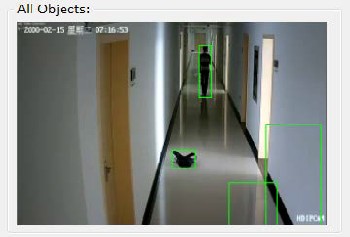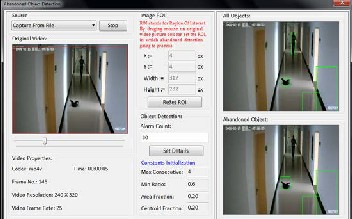1. Select video file from Disk.
2. Select live video stream.

International Journal of Scientific & Engineering Research, Volume 5, Issue 5, May-2014 1282
ISSN 2229-5518
An Abandoned Object Detection from Real time video.
Kulkarni Abhishek, Kulkarni Saurabh, Patil Aniket, Patil Girish.
—————————— ——————————
In last decade many terrorist attacks took place at railway stations, hotels, malls, Cinema halls, Parliament House and at many other crowded places. Many people lost their lives in this. To fight with such anti-social activities government appointed multiple Strategies. Video Surveillance System is one among them.
But the problem with CCTV system is they are fully controlled and monitored by Human. Survey on CCTV shows that they are mainly used for investigation of case rather than monitoring live footage of CCTV. That was primary issue why it didn’t help to avoid the terrorist attacks. Another reason behind that was limitation of human to response highly sensible situation. Human eyes have some limits to process complex real time video. Human eyes are not effective for looking at multiple Displays at a time.
So to enhance the processing of CCTV system for real time video stream abandoned object detection System was introduced.
Many algorithms and techniques were suggested by many researcher, scientists to design Abandoned Object detection System. But most of them are practically more complex and more expensive to implement.
Some uses physical components such as highly expensive filters, lasers, sonic waves etc. it is not possible to install all those cause the cost factor.
The proposed System is simple and effective. It avoids the Use of above expensive physical components. It simply works on Dual background segmentation scheme. It is highly immune to various lightning conditions
• Abhishek Kulkarni is currently pursuing bachelor degree program in computer engineering in Pune University, India, PH-7588088639. E-mail: ab.kulkarni02@gmail.com
• Saurabh Kulkarni is currently pursuing bachelor degree program in computer engineering in Pune University, India, PH-9421201879. E-mail: ksaurabh.sdk@gmail.com
• Aniket Patil is currently pursuing bachelor degree program in computer
engineering in Pune University, India, PH-8149601021. E-mail:
• Girish Patil is currently pursuing bachelor degree program in computer engineering in Pune University, India, PH-9404417271. E-mail:
Object detection is a computer technology related to computer vision and image processing that deals with detecting instances of semantic objects of a certain class (such as humans, buildings, or cars) in digital images and videos. Well- researched domains of object detection include face detection and Abandoned Object detection from CCTV system. Object detection has applications in many areas of computer vision, including image retrieval and video Surveillance.
In dictionaries an abandoned object is defined as the object which left back by someone with evil intention. Here we consider abandoned object as object which remains stationary or inactive for some predefined time interval. This time interval is varies as per the need of surrounding. The CCTV observer or controller have rights to modify the threshold value.
The Proposed system is Software based system. The system is modular in nature. It consists 8 modules.
1. Control module.
2. Input selection module.
3. Data extraction.
4. Data conversion.
5. Background segmentation module.
6. Blob detection and analysis.
7. Abandoned Object Detection.
8. Display results.
IJSER © 2014 http://www.ijser.org
International Journal of Scientific & Engineering Research, Volume 5, Issue 5, May-2014 1283
ISSN 2229-5518
Control module is the main module of the system. It initializes all the variables. It initiates the process when appropriate instruction is made by user. It controls all other module. To process multiple Video streams in parallel this modules generate Constructor for individual processes.
In this module the process of choosing input method is initialized. It calls for the proper function as per input selected by user. There are two types of Input on which system can work.
1. Select video file from Disk.
2. Select live video stream.
In this module important information about video is fetched. It includes video length, video type, frame rate, frame length, frame Height.
In this module the video is converted into the frames. Frame is a simply image. Not every frame is selected but some about every 0.6 second is selected. This frame is initiated to background image and buffer background image. The images are stored in form of matrix with position and intensity of that pixel.
This Module is actual processing module. In this module the processing on the set of matrices is done. The binary image is generated by subtracting current image from background. As we are interested in all pixels that are remains stationary for some time; period binary image provide set of all stationary pixels. This pixels may or may not be part of abandoned object. This will be checked in next Module Blob analysis.
Blob is a rectangle shaped set of pixels. The blob have some properties such as centroid, the height and left value of top & leftmost pixel Area. Blob are considered as feasible solution for Abandoned Object. Blob detection simply detects
all objects.
Abandoned object detection block simply put abandoned object in picture. It works with timer to process all detected blobs from previous unit. It checks time of particular blob for which it is stable. If it is grater or equal to value defined by user, blob is highlighted.
Display unit is last unit of object detection system. As
its name suggests it simply display all the results. The result
may include following:
1. All detected objects.
2. Abandoned object.
3. Alarm Count.
4. ROI (Region of Interest).
5. Timer.
Abandoned object system is implemented using dual background segmentation. The result is highly robust in nature. It is self-adaptive. The system costs lower as compared
International Journal of Scientific & Engineering Research, Volume 5, Issue 5, May-2014 1284
ISSN 2229-5518
to other systems which consists filters, infrared and noise detection and reduction techniques.
The Abandoned object detection system is very useful
in multiple environment because of its portability. The simple mathematical processing make system to be available in real time environment along with post processing.
We acknowledges helpful discussions with N.K. Patil, Jai P. Chavan, and Pallavi S. Bangare. Also this work is partially supported by Sinhgad Institute of Technology, Lonavala, India.
[1] A. Singh, S. Sawan, M. Hanmandlu, V.K. Madasu, B.C. Lovell, “An abandoned object detection system based on dual background segmentation” IEEE 2009 Advanced Video and Signal Based Surveillance.
[2] Pallavi S, Bangare, Nilesh J. Uke, Sunil L. Bangare, “An approach for detecting abandoned object from real time video” 2012 International Journal of Engineering Research and Application(IJERA) ISSN: 2248-
9622.
[3] Xuli LI, Chao Zhang, Duo Zhang, “An Abandoned Object Detection
Using Double Illumination Invariant Foreground Mask” 2010
International Conference on Pattern Recognition,1051-4651/10,2010
IEEE
[4] C. Sears and Z. Pylyshyn, “Multiple Object Tracking and Attentional
Processing”, Canadian Journal of Experimental Psychology, vol.
54,2000, pp. 1-14.
[5] N. Bird, S. Atev, N. Caramelli, R. Martin, O. Masoud and N. papanikolopoulos, “Real Time Online Detection Of Abandoned Object in Public Areas”, in Proceedings of IEEE International Conference Processing, vol. 2008, 2008.
[6] M. Bhargava, C-C. Chen, M.S. Ryoo, and J.K. Aggarwal, “Detection of Abandoned Object in Crowded Environments”, in Proceedings of IEEE Conference on Advanced Video and Signal Based Surveillance,
2007, pp. 271-276.
[7] F. Porikli, Y. Invanov, and T. Haga, “Robust Abandoned Object Detection Using Dual Foregrounds”, Eurasip Journal on Advanced in Signal Processing, vol. 2008, 2008
[8] Chih-Yang Lin and Wen-Hao Wang, “An Abandoned Objects Management System Based on the Gaussian Mixture Model ”, International Conference on Convergence and Hybrid Information Technology 2008 978-0-7695-3328-5/08, 2008 IEEE
[9] P. Cavanaugh and G. Alvarez, “Tracking Multiple Targets with Multifocal Attention”, Trends in Cognitive Sciences, vol. 9(7), 2005, pp. 349-354.
[10] N. Friedman and S. Russell, “Image Segmentation in Video Sequence: a probabilistic Approach”, in Proceedings of Annual Conference on Uncertainty in Artificial Intelligence, 1997, pp. 175-181.
[11] http://en.wikipedia.org/wiki/Abandonded_object.